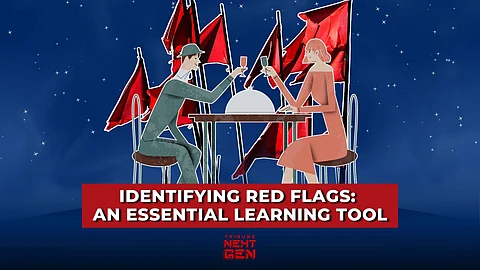
- NEWS
- the EDIT
- COMMENTARY
- BUSINESS
- LIFE
- SHOW
- ACTION
- GLOBAL GOALS
- SNAPS
- DYARYO TIRADA
- MORE

Recently, the University of the Philippines Open University (UPOU) revealed the 44 Massive Open Online Courses (MOOCs) they would be offering this year for free. Among these, one course caught the attention of many, with some wondering why the state university would offer such a course. The course in question is "Identifying Red Flags."
In today’s rapidly evolving social landscape, UPOU has taken a progressive step by offering this initiative. After all, as social beings, having social relationships or human connections is an important part of our lives. Feeling loved and having a sense of connection and belonging contribute to our mental health.
However, not all relationships are healthy or contribute to our overall well-being. Some relationships damage rather than enhance our mental and emotional health. Others can even become toxic, making it essential to recognize the red flags.
A “red flag” is a term widely used to describe warning signs or indicators of potential problems, unhealthy behaviors, or toxic situations. These flags often appear early in relationships or interactions and serve as signals to proceed with caution or, in some cases, to disengage entirely. They can be subtle or obvious and can relate to various aspects of life, including personal relationships, workplaces, and even online interactions.
The term has gained popularity in modern vernacular and is even defined in the Urban Dictionary as “a warning sign that something is problematic or dangerous, often in a romantic relationship.”
It’s frequently used in the context of dating, where recognizing red flags can mean the difference between building a healthy relationship and entering a toxic or harmful one.
Red flags in a romantic partner may include signs of narcissism, aggression, victimization, or even abusive behavior. Toxic behavior is often subtle and insidious, creeping into moments of vulnerability. Without the ability to recognize and resist it, such behavior can take control over one’s life.
Red flags in relationships are warning signs that indicate unhealthy or manipulative behavior. Examples include controlling tendencies, lack of respect, love bombing, and emotional or physical abuse. These behaviors may start subtly but tend to become more problematic over time, potentially leading to toxic dynamics.
While red flags in friendships can include consistent disrespect, jealousy, manipulation, and a lack of support during difficult times. If a friend is frequently negative, dismisses your feelings, or tries to control your actions, these are strong indicators of an unhealthy friendship.
Such behaviors often mirror those seen in toxic romantic relationships, emphasizing the importance of maintaining healthy boundaries in all forms of connection.
The dating landscape for young Filipinos has undergone significant changes, blending traditional values with modern influences. Social media, dating apps, and increased exposure to global culture have reshaped how relationships begin and develop. However, these changes also come with challenges, such as:
Unrealistic expectations. Curated portrayals of relationships on social media can create unhealthy comparisons.
Casual dating risks. The rise of hookup culture and casual dating can sometimes blur boundaries, making it harder to identify toxic behaviors.
Online deception. Catfishing, ghosting, and breadcrumbing have become prevalent issues, leaving many vulnerable to emotional harm.
Amid these challenges, understanding red flags becomes essential for protecting one’s emotional and mental well-being.
Red flags aren’t limited to romantic relationships. They can also manifest in friendships, workplaces, or family dynamics. Recognizing them is crucial for:
Maintaining mental health. Unaddressed red flags can lead to prolonged stress, anxiety, or emotional burnout.
Setting boundaries. Understanding warning signs empowers individuals to establish and enforce personal boundaries.
Preventing escalation. Identifying issues early can prevent them from escalating into more serious conflicts or harm.
In relationships, both romantic and platonic, understanding the signs of toxicity is critical to maintaining a balanced life. Though currently there is no course description, UPOU’s "Identifying Red Flags" course can underscore the importance of recognizing red flags as an essential aspect of self-care. By integrating such learnings into our everyday interactions, we can contribute to a future where respect, empathy, and trust define our connection.
